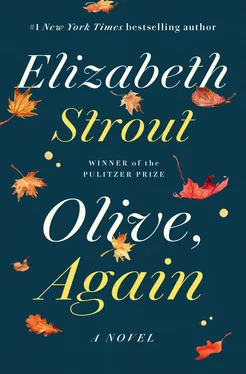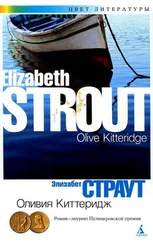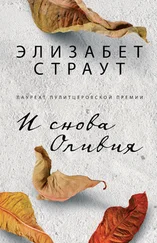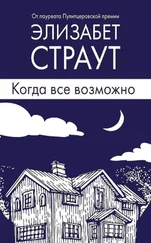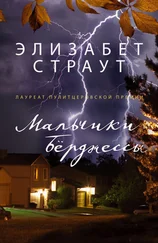And then Kayley thought about Mr. Ringrose, who, in a way, she had never stopped thinking about, the loneliness he must have endured, and was enduring still, now just a few feet away.
Kayley shook her head, and pulled her arms up to cover her face. At the moment—only for this moment—it was all she wanted, just to be near him again.
They were late.
—
Olive Kitteridge hated people who were late. A little after lunchtime, they had said, and Olive had the lunch things out, peanut butter and jelly for the two oldest kids, and tuna fish sandwiches for her son and his wife, Ann. About the little ones, she had no idea; the baby must not eat anything solid yet, only being six weeks old; Little Henry was over two, but what did two-year-olds eat? Olive couldn’t remember what Christopher ate when he was that age. She walked into the living room, looking at everything through the eyes of her son; he would have to realize as soon as he walked in. The phone rang, and Olive moved quickly back to the kitchen to answer it. Christopher said, “Okay, Mom, we’re just leaving Portland, we had to stop for lunch.”
“Lunch?” said Olive. It was two o’clock in the afternoon. The late April sun was a milky sun, seen through the window over the bay, which shone with a steely lightness, no whitecaps today.
“We had to get something for the kids to eat. So we’ll be there soon.”
Portland was an hour away. Olive said, “Okay, then. Will you still be needing supper?”
“Supper?” asked Christopher, as though she had proposed they take a shuttle to the moon. “Sure, I guess so.” In the background Olive heard a scream. Christopher said, “Annabelle, shut up! Stop it right now. Annabelle, I’m counting to three….Mom, I’ll have to call you back,” and the phone went dead.
“Oh Godfrey,” Olive murmured, sitting down at the kitchen table. She had still not taken the pictures from the wall, yet the place looked remarkably different, as though—as was the case—she would be moving out of it soon. She did not think of herself as a person who had knickknacks, but there was a box of stuff in the back corner of the kitchen, and as she glanced into the living room from where she sat, that room seemed to her to be even more guilty; there was only the furniture and the two paintings on the wall. The books were gone—she had given them to the library a week ago—and the lamps, except for one, were packed into a box as well.
The phone rang again. “Sorry about that,” said her son.
“Are you supposed to be talking on a cellphone and driving?” Olive asked.
“I’m not driving. Ann’s driving. Anyway, we’ll be there when we get there.”
“All right then,” Olive said. She added, “I’ll be awful glad to see you.”
“Me too,” said her son.
Me too.
Hanging up she walked through the house, and trepidation fluttered through her. “You’re doing this all wrong,” she said quietly to herself. “Oh Godfrey Mighty, Olive.” Almost three years it had been since she had seen her son. This did not seem natural or right to Olive. And yet when she had gone to visit him in New York City—when Ann was pregnant with Little Henry, and way before Ann had this other child, Natalie, a baby now—the visit had gone so poorly that her son had essentially asked her to leave. And she had left. And she had seen him only once since, soon after, when he had flown to Maine for his father’s funeral and spoken before the whole church, tears coming down his face. “I never heard my father swear” was one thing her son had said that day.
Olive checked the bathroom, made sure there were clean towels, she knew there were clean towels, but she could not stop herself from checking again. They had said not to worry about not having a crib, but Olive did worry. Little Henry was two and a half years old, and Natalie was six weeks, how could they not have a crib? Well, judging by how she had seen them living in New York—God, what a mess that house had been—she decided they could make do with about anything. Annabelle was almost four now, Theodore was six. What did a six-year-old boy want to do? And why did they have so many children? Ann had had Theodore with one man, Annabelle with another, and now she had spit out two more babies with Christopher. What in God’s name was that about? Christopher was not a young man.
—
In fact, when Olive saw him stepping out of the car she could not believe—she could not believe—that he had gray in his hair now. Christopher! She walked toward him, but he was opening the doors of the car, and little children spilled out. “Hi, Mom.” He nodded at her. There was the little dark-haired girl, dressed in a bulky pink nylon coat, also wearing a pair of knee-high rubber boots, robin’s-egg blue, who turned away immediately, and the blond boy, older, who stared at Olive; Ann was taking her time getting the baby out of the car. Olive went to Christopher, her son, and she put her arms around him, and felt the awkwardness of his older man’s body in her arms. She stepped back, and he stepped back, then he reached into the car and leaned over a child in an apparatus that looked like a small pilot seat for a child headed to outer space; he brought out the kid, and said to his mother, “Here’s Henry.”
The child looked with large slumbering eyes at Olive, and he was placed, standing, on the ground, where he held on to his father’s leg. “Hello, Henry,” Olive said, and the child’s eyes rolled up slightly, then he pressed his face into his father’s pant legs. “Is he all right?” Olive demanded, because the sight of him, dark-haired like his mother, dark-eyed as well, caused her to think immediately: This is not Henry Kitteridge! What had she thought? She had thought she would see her husband in the little boy, but instead she saw a stranger.
“He’s just waking up,” Christopher said, picking the child up.
“Well, come in, come in,” Olive said, realizing then that she had not spoken yet to Ann, who held the baby patiently nearby. “Hello there, Ann,” Olive said, and Ann said, “Hello, Olive.”
“Your boots are as blue as your hat,” Olive said to the little girl, and the little girl looked puzzled and walked to her mother. “It’s an expression,” Olive explained—the child wore no hat.
Ann said, “We got those boots for our trip to Maine,” and this confused Olive.
“Well, take them off before you come inside,” Olive said.
In New York, Ann had asked if she could call Olive “Mom.” Now Ann did not move toward Olive, and so Olive did not walk toward Ann, but turned and walked into the house instead.
Three nights they were to stay.
Once in the kitchen, Olive watched her son carefully. His face at first seemed open, pleased as he looked around. “Jesus, Mom, you’ve really cleaned up. Wow.” Then she saw the shadow come. “Wait, have you given away everything of Dad’s? What’s the story?”
“No, of course I haven’t.” Then she said, “Well, sure, some of it. He’s been gone a while, Chris.”
He looked at her. “What?”
She repeated what she had said, but she turned away as she said it. Then she said, “Theodore, would you like a drink of water?” The boy stared at her with huge eyes. Then he shook his head slightly and walked over to his mother, who, even as she was holding the baby, was shrugging her way out of a bulky black sweater. Olive could see that Ann’s stomach bulged through her black stretch pants, although her arms seemed skinny in a white nylon blouse.
Ann sat down at the kitchen table and said, “I’d like a glass of water, Olive,” and when Olive turned around to hand it to her, she saw a breast—just sticking out in plain view, right there in the kitchen, the nipple large and dark—and Olive felt a tiny bit ill. Ann pressed the baby to her, and Olive saw the little thing, eyes closed, clasp onto the nipple. Ann smiled up at Olive, but Olive thought it was not a real smile. “Phew,” Ann said.
Читать дальше
